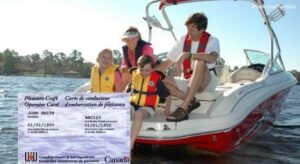It’s the Law
The Southern Georgian Bay OPP Marine Water Patrol will make occasional spot check visits to enforce laws and regulations related to water safety. All types of watercrafts are always subject to the various laws and regulations, regardless of who is operating them. This includes all forms of non-motorized watercraft.
Equipment
All watercraft, including powerboats, PWCS, canoes, kayaks, sailboats, sailboards, stand up paddle boards, paddle boats, and other watercraft are required to have safety equipment on board. The type and amount of equipment is determined by the size of watercraft. Minimum fines for each infraction range from $100 (lack of a paddle/oar or anchor) to $200 (lack of a lifejacket for each person on board).

Competency
All operators of all powerboats and PWCs require a Pleasure Craft Operator Card and they must have proof of operator competency by always having their card on them when operating a powered watercraft. Operators without proof of ‘competency’ could face fines as much as $250.
10/30 Rule
All powered watercrafts must operate at a speed of 10 km/h or less when within 30 metres of shore.
Booze and You Lose
Alcohol is involved in over 40% of all power boating accidents. Pleasure craft operators must not drive under the influence (alcohol, drugs). Anyone caught operating a pleasure craft under the influence of alcohol or drugs will face the same penalties as motorists: your Ontario driver’s licence will be suspended or, if you are found to be legally impaired while operating a motorboat, you will lose your driver’s licence for a year or more and face a hefty fine.
Towed Water Sports
A ‘qualified’ observer or spotter over the age of 16 is required for all behind the powered watercraft activities. Boat operators are not considered observers/spotters. There must be a spotter and a seat available on a PWC for each person being towed; it is not legal to tow a skier, wakeboarder, or a tuber with a two seat PWC. Towing activities must not occur ½ hour before sunrise and ½ hour after sunset.
Common Courtesy
Some boaters do not consider the rights and needs of others or the environment.
- Keep the Bow Low. Trim your powered watercraft and adjust your speed to minimize your wake. Waves generated by boats can capsize smaller non-powered watercraft, potentially damage moored boats and docks, and impact wildlife and the aquatic environment.
- Water Activity. Be sensitive to others relaxing on their docks and shoreline. Don’t stay in one area too long making repeated runs in front of the same lake properties.
- Right of Way Powered watercraft are required to heed the right of way of all non-powered watercraft including sailboats, canoes, kayaks, paddle boats, stand up paddle boards, and windsurfers.
- Never buzz or tail another watercraft, jump the wake of another powered watercraft, or try to spray other watercraft or swimmers.
Lake Swimming Safety
Just as watercraft can pose a danger to swimmers, swimmers can pose a danger to powered watercraft as well as themselves.
- Never swim alone.
- When venturing out into the deeper open areas of the lake, swim with a buddy in a watercraft. Power watercraft operators can readily observe another watercraft but may have difficulty seeing a swimmer in the water due to the sun’s glare, choppy waves, or low light conditions at dusk or dawn.
Check out the Canadian Red Cross Summer Water Safety information.
Be mindful and observant
If you see a powered watercraft being operated in a way that causes you concern or think is violating the law:
- Please call the OPP at phone number 1-888-310-1122 for non-urgent issues
- Provide the police with the following information:
- Description of the watercraft
- Registration number of the watercraft
- Description of the operator
- Nature of the incident
Any photo images of the incident
